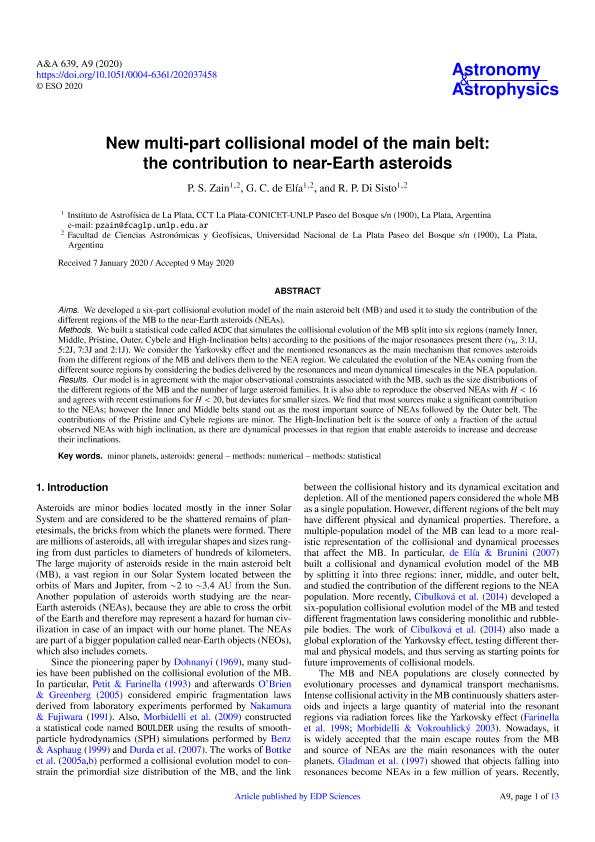Mostrar el registro sencillo del ítem
dc.contributor.author
Zain, Patricio Salvador

dc.contributor.author
de Elia, Gonzalo Carlos

dc.contributor.author
Di Sisto, Romina Paula

dc.date.available
2021-10-20T14:20:00Z
dc.date.issued
2020-07
dc.identifier.citation
Zain, Patricio Salvador; de Elia, Gonzalo Carlos; Di Sisto, Romina Paula; New multi-part collisional model of the main belt: The contribution to near-Earth asteroids; EDP Sciences; Astronomy and Astrophysics; 639; A9; 7-2020; 1-13
dc.identifier.issn
0004-6361
dc.identifier.uri
http://hdl.handle.net/11336/144432
dc.description.abstract
Aims. We developed a six-part collisional evolution model of the main asteroid belt (MB) and used it to study the contribution of the different regions of the MB to the near-Earth asteroids (NEAs). Methods. We built a statistical code called ACDC that simulates the collisional evolution of the MB split into six regions (namely Inner, Middle, Pristine, Outer, Cybele and High-Inclination belts) according to the positions of the major resonances present there (ν6, 3:1J, 5:2J, 7:3J and 2:1J). We consider the Yarkovsky effect and the mentioned resonances as the main mechanism that removes asteroids from the different regions of the MB and delivers them to the NEA region. We calculated the evolution of the NEAs coming from the different source regions by considering the bodies delivered by the resonances and mean dynamical timescales in the NEA population. Results. Our model is in agreement with the major observational constraints associated with the MB, such as the size distributions of the different regions of the MB and the number of large asteroid families. It is also able to reproduce the observed NEAs with H < 16 and agrees with recent estimations for H < 20, but deviates for smaller sizes. We find that most sources make a significant contribution to the NEAs; however the Inner and Middle belts stand out as the most important source of NEAs followed by the Outer belt. The contributions of the Pristine and Cybele regions are minor. The High-Inclination belt is the source of only a fraction of the actual observed NEAs with high inclination, as there are dynamical processes in that region that enable asteroids to increase and decrease their inclinations.
dc.format
application/pdf
dc.language.iso
eng
dc.publisher
EDP Sciences

dc.rights
info:eu-repo/semantics/openAccess
dc.rights.uri
https://creativecommons.org/licenses/by-nc-sa/2.5/ar/
dc.subject
METHODS: NUMERICAL
dc.subject
METHODS: STATISTICAL
dc.subject
MINOR PLANETS, ASTEROIDS: GENERAL
dc.subject.classification
Astronomía

dc.subject.classification
Ciencias Físicas

dc.subject.classification
CIENCIAS NATURALES Y EXACTAS

dc.title
New multi-part collisional model of the main belt: The contribution to near-Earth asteroids
dc.type
info:eu-repo/semantics/article
dc.type
info:ar-repo/semantics/artículo
dc.type
info:eu-repo/semantics/publishedVersion
dc.date.updated
2021-09-08T18:58:09Z
dc.journal.volume
639
dc.journal.number
A9
dc.journal.pagination
1-13
dc.journal.pais
Francia

dc.description.fil
Fil: Zain, Patricio Salvador. Consejo Nacional de Investigaciones Científicas y Técnicas. Centro Científico Tecnológico Conicet - La Plata. Instituto de Astrofísica La Plata. Universidad Nacional de La Plata. Facultad de Ciencias Astronómicas y Geofísicas. Instituto de Astrofísica La Plata; Argentina
dc.description.fil
Fil: de Elia, Gonzalo Carlos. Consejo Nacional de Investigaciones Científicas y Técnicas. Centro Científico Tecnológico Conicet - La Plata. Instituto de Astrofísica La Plata. Universidad Nacional de La Plata. Facultad de Ciencias Astronómicas y Geofísicas. Instituto de Astrofísica La Plata; Argentina
dc.description.fil
Fil: Di Sisto, Romina Paula. Consejo Nacional de Investigaciones Científicas y Técnicas. Centro Científico Tecnológico Conicet - La Plata. Instituto de Astrofísica La Plata. Universidad Nacional de La Plata. Facultad de Ciencias Astronómicas y Geofísicas. Instituto de Astrofísica La Plata; Argentina
dc.journal.title
Astronomy and Astrophysics

dc.relation.alternativeid
info:eu-repo/semantics/altIdentifier/url/https://www.aanda.org/10.1051/0004-6361/202037458
dc.relation.alternativeid
info:eu-repo/semantics/altIdentifier/doi/https://doi.org/10.1051/0004-6361/202037458
Archivos asociados
